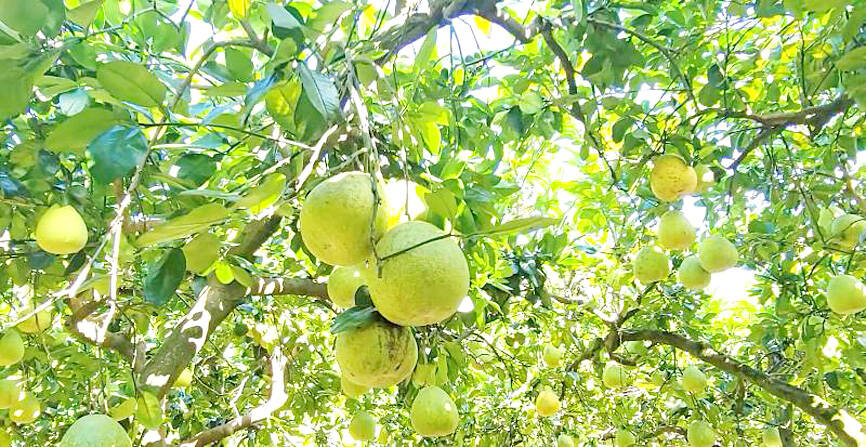The Chinese General Administration of Customs yesterday announced the lifting of a ban on some agricultural and fishery imports from Taiwan, following a meeting with a Chinese Nationalist Party (KMT) delegation.
The announcement was made shortly after a meeting between China General Administration of Customs
Deputy Director Zhao Zhenglian (趙增連) and the delegation, which was headed by KMT caucus whip Fu Kun-chi.

Photo: Taipei Times file
Zhao told a news conference that China was “willing to strengthen communications with the KMT and other parties in Taiwan on the issue of resuming imports of pomelo and other agricultural and fishery products.”
Zhao said the decision was being made “on the basis of scientific assessments in accordance with China’s laws and regulations,” and that Beijing hoped to “actively promote the peaceful development of cross-strait relations on the basis of adherence to the ‘1992 consensus’ and opposition to Taiwanese independence.”
China initially imposed a ban on imports of pomeloes, largehead hairtail and frozen mackerel from Taiwan following a visit to Taipei by then-US House of Representatives speaker Nancy Pelosi in August 2022, in what was seen as a retaliatory response to the visit.
In Taipei, the Ministry of Agriculture yesterday said it has not received official confirmation regarding the lifting of the ban, and added that it hoped all future communications on the issue would go through official channels.
Acting Minister of Agriculture Chen Junne-jih (陳駿季) said he had only learned about the news through media reports, and that he had no information about a specific time frame for the resumption of regular trade of the banned items.
In the past, communication with China on the issue of agricultural products proceeded through a shared quarantine platform, he said, adding that he hoped the platform would continue to be used.
“The trade of agricultural products requires quarantine inspections, so we hope that China would communicate with us through proper channels and not through media reports,” he said.
Prior to the ban, Taiwan exported 7,062 tonnes of pomeloes in 2021, of which 4,821 tonnes were sold to China, Ministry of Agriculture statistics showed.
In 2022, exports dropped to 2,909 tonnes for the year, of which 2,623 tonnes were sold to Hong Kong — the year’s largest export market for the fruit.
Last year, 2,709 tonnes of pomeloes were exported, with Hong Kong again being the largest buyer at 1,823 tonnes.
“The Ministry of Agriculture attaches importance to every export market and would continue to explore different high-end markets for Taiwanese products,” Chen said.
The “1992 consensus” refers to a tacit understanding between the Chinese Nationalist Party (KMT) and the Chinese Communist Party (CCP) that both sides of the Taiwan Strait acknowledge that there is “one China,” with each side having its own interpretation of what “China” means.
Former Mainland Affairs Council chairman Su Chi (蘇起) in 2006 admitted that he made up the term in 2000 to break the cross-strait deadlock and alleviate tension.
Additional reporting by CNA

Three Taiwanese airlines have prohibited passengers from packing Bluetooth earbuds and their charger cases in checked luggage. EVA Air and Uni Air said that Bluetooth earbuds and charger cases are categorized as portable electronic devices, which should be switched off if they are placed in checked luggage based on international aviation safety regulations. They must not be in standby or sleep mode. However, as charging would continue when earbuds are placed in the charger cases, which would contravene international aviation regulations, their cases must be carried as hand luggage, they said. Tigerair Taiwan said that earbud charger cases are equipped

Foreign travelers entering Taiwan on a short layover via Taiwan Taoyuan International Airport are receiving NT$600 gift vouchers from yesterday, the Tourism Administration said, adding that it hopes the incentive would boost tourism consumption at the airport. The program, which allows travelers holding non-Taiwan passports who enter the country during a layover of up to 24 hours to claim a voucher, aims to promote attractions at the airport, the agency said in a statement on Friday. To participate, travelers must sign up on the campaign Web site, the agency said. They can then present their passport and boarding pass for their connecting international

UNILATERAL MOVES: Officials have raised concerns that Beijing could try to exert economic control over Kinmen in a key development plan next year The Civil Aviation Administration (CAA) yesterday said that China has so far failed to provide any information about a new airport expected to open next year that is less than 10km from a Taiwanese airport, raising flight safety concerns. Xiamen Xiangan International Airport is only about 3km at its closest point from the islands in Kinmen County — the scene of on-off fighting during the Cold War — and construction work can be seen and heard clearly from the Taiwan side. In a written statement sent to Reuters, the CAA said that airports close to each other need detailed advanced

The age requirement for commercial pilots and airline transport pilots is to be lowered by two years, to 18 and 21 years respectively, to expand the pool of pilots in accordance with international standards, the Ministry of Transportation and Communications announced today. The changes are part of amendments to articles 93, 119 and 121 of the Regulations Governing Licenses and Ratings for Airmen (航空人員檢定給證管理規則). The amendments take into account age requirements for aviation personnel certification in the Convention on International Civil Aviation and EU’s aviation safety regulations, as well as the practical needs of managing aviation personnel licensing, the ministry said. The ministry